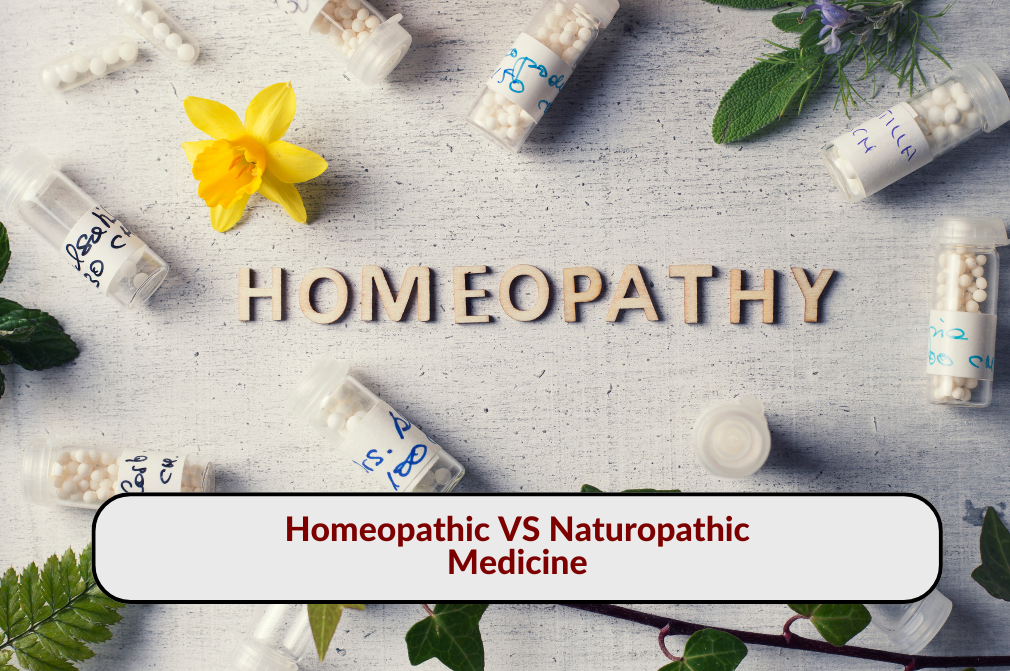Homeopathic VS Naturopathic Medicine
At Red Leaf Wellness, we understand that navigating the world of alternative medicine can be overwhelming. You want the best for your health, but with so many options, it’s hard to know where to start. If you’ve ever wondered about the differences between homeopathic vs naturopathic medicine, you’re not alone.
These two approaches to holistic health care are often confused, yet they offer distinct paths to wellness. Whether you’re exploring Edmonton acupuncture and more or looking into functional medicine, understanding these two methods can help you make informed decisions about your healthcare journey. This blog post will guide you through the key differences, benefits, and applications of both homeopathic vs naturopathic medicine, helping you choose the best approach for your needs.
What Is Homeopathic Medicine?
 Homeopathy, a practice with roots dating back over 200 years, is based on the principle of “like cures like.” This means that substances which can cause symptoms in a healthy person are used in very diluted forms to treat similar symptoms in someone who is ill.
Homeopathy, a practice with roots dating back over 200 years, is based on the principle of “like cures like.” This means that substances which can cause symptoms in a healthy person are used in very diluted forms to treat similar symptoms in someone who is ill.
The idea is to stimulate the body’s natural healing processes by introducing minute doses of natural substances. These substances are derived from plants, minerals, and animals.
The Principle Behind Homeopathy
The core philosophy of homeopathy revolves around the body’s ability to heal itself when given the right stimuli. Homeopathic remedies are created through a process called potentization.
In this process, the original substance is diluted in water or alcohol and then vigorously shaken. Despite the dilution, homeopaths believe that the solution retains a “memory” of the original substance. This “memory” is thought to trigger the body’s healing response.
Applications of Homeopathy
Homeopathy is widely used to treat chronic conditions such as migraines, allergies, and digestive disorders. It is also used for mental health concerns like anxiety and depression.
Additionally, many patients turn to homeopathic remedies for UTI as a natural alternative to conventional treatments. Homeopathic doctors typically tailor these remedies to the individual’s specific symptoms. This makes homeopathy a highly personalized form of treatment.
The Role of a Homeopathic Specialist Doctor
A homeopathic specialist doctor focuses on identifying the right remedy for the patient’s unique set of symptoms. This involves a detailed consultation where the patient’s physical, emotional, and mental health are considered. In some regions, such as the United States and Canada, becoming a homeopathic doctor does not require a medical degree, though practitioners may still undergo rigorous training.
For those interested in how to become a naturopath, it’s worth noting that naturopathic doctors often include homeopathy as part of their broader toolkit. They can blend it with other natural therapies.
If you’re exploring homeopathy in Alberta, the Alberta Homeopathic Association offers resources and information about the practice in our region.

What Is Naturopathic Medicine?
Naturopathic medicine is a distinct primary health care profession that emphasizes prevention, treatment, and optimal health through the use of therapeutic methods and substances that encourage individuals’ inherent self-healing process.
What is naturopathic medicine in practical terms? It’s an approach that combines modern scientific knowledge with traditional healing wisdom, using a variety of natural therapies to treat the root causes of disease.
The Principles of Naturopathic Medicine
Naturopathic doctors (NDs) adhere to six guiding principles:
- First Do No Harm: NDs choose the least invasive treatments first, minimizing the risk of harmful side effects.
- The Healing Power of Nature: NDs trust the body’s inherent wisdom to heal itself.
- Identify and Treat the Causes: Instead of just treating symptoms, NDs look for and address the underlying causes of illness.
- Doctor as Teacher: NDs educate their patients about their health, empowering them to take control of their own wellness.
- Treat the Whole Person: NDs consider the whole person, including physical, mental, emotional, genetic, environmental, social, and other factors.
- Prevention: NDs emphasize disease prevention by assessing risk factors and hereditary susceptibility to disease and making appropriate interventions to prevent illness.
Naturopathic Treatments and Therapies
Naturopathic medicine encompasses a wide range of treatments, including botanical medicine, nutrition counseling, acupuncture, hydrotherapy, physical medicine, and lifestyle counseling. Naturopathic doctors are also trained in homeopathy vs naturopathy, enabling them to incorporate homeopathic remedies when appropriate.
The Role of a Naturopathic Doctor
Becoming a naturopathic doctor involves rigorous training. NDs must complete a four-year graduate-level program at an accredited naturopathic medical school. This education includes coursework in basic medical sciences, clinical sciences, and natural healing modalities. After completing their education, NDs must pass a standardized board exam to become licensed to practice.
One common question is, can naturopaths prescribe drugs? The answer varies by region, but in many places, NDs can prescribe certain medications, making them versatile healthcare providers. Additionally, NDs are trained to perform diagnostic procedures, such as ordering blood tests, leading to comprehensive and personalized care.
If you’re considering working with a naturopath in the Edmonton area, explore more about our Naturopathic Doctor Edmonton services at Red Leaf Wellness.

Homeopathic VS Naturopathic Medicine: Key Differences
When comparing homeopathic vs naturopathic medicine, the most significant difference lies in the scope of practice. While homeopathic doctors focus solely on homeopathy, naturopaths use a broader range of treatments. This allows naturopaths to address a wider variety of health issues, from acute conditions to chronic diseases, using a combination of natural therapies.
Homeopathic VS Naturopathic Medicine Approaches
In a homeopathic clinic, the focus is on identifying a single remedy that matches the patient’s symptoms. This approach is highly individualized, with the homeopath seeking to stimulate the body’s natural healing processes with minimal intervention.
On the other hand, a naturopath vs homeopath might employ multiple therapies, such as herbal medicine, acupuncture, and lifestyle modifications, in addition to homeopathy. This integrative approach is designed to treat the whole person, addressing not just symptoms but also the underlying causes of illness.
For instance, at Red Leaf Wellness, we combine various modalities such as cupping and acupuncture with naturopathic treatments to create a holistic approach tailored to each patient’s needs.
Treatment Modalities: Homeopathic VS Naturopathic
While homeopathy is a significant part of naturopathic medicine, it is just one of many tools at the naturopath’s disposal. For instance, in addition to homeopathy, naturopaths might recommend dietary changes, supplements, or other natural therapies to promote healing. This comprehensive approach can be particularly beneficial for patients with complex health issues, as it allows for a more personalized and effective treatment plan.
Patients often ask, can naturopaths order blood tests? Yes, in many regions, naturopaths can order and interpret laboratory tests, which allows them to develop more informed and targeted treatment plans. This is another area where homeopathic vs naturopathic doctors differ, as homeopaths typically do not use such diagnostic tools in their practice.
Homeopathic VS Naturopathic Doctor: Education and Training
The educational paths for homeopaths and naturopaths differ significantly. Homeopathic doctors typically complete diploma programs and may receive certification from professional organizations. In contrast, naturopathic doctors undergo extensive training, including a four-year doctoral program at an accredited naturopathic medical school, followed by board certification. This difference in training reflects the broader scope of practice for naturopaths, who are trained to diagnose and treat a wide range of health conditions.
For more information about naturopaths in Alberta, you can visit the Alberta Association of Naturopathic Doctors.
Insurance and Accessibility
Another consideration when choosing between homeopathic vs naturopathic medicine is insurance coverage. Many patients wonder, does insurance cover homeopathic medicine? Coverage can vary widely depending on the insurer and the region. However, because naturopathic medicine includes a broader range of services, it is often more likely to be covered by insurance plans, particularly in regions where naturopaths are licensed healthcare providers.
Additionally, naturopathic doctors are part of our integrated care team offering a variety of treatments that may be covered by insurance, such as BHRT Edmonton and other functional medicine services.

Conclusion: Homeopathic VS Naturopathic Medicine
In conclusion, both homeopathic vs naturopathic medicine offer valuable approaches to health care, each with its unique strengths. Homeopathy provides a highly personalized treatment option focused on stimulating the body’s natural healing processes with minimal intervention. In contrast, naturopathy offers a more comprehensive approach, using a variety of natural therapies to treat the whole person and address the root causes of illness.
At Red Leaf Wellness, we believe in the power of both approaches and offer integrative care that combines the best of both worlds. Contact us today for more information or book your appointment now.
Our Experienced Practitioners:
Dr. McCarthy 🇬🇧
Dr. Lorraine McCarthy is a Naturopathic Doctor with nearly two decades of experience providing compassionate, patient-centered care. Since graduating from the Canadian College of Naturopathic Medicine in 2004, she has served the communities of Ottawa and Edmonton, offering comprehensive solutions to diverse health concerns. Her extensive background includes roles in the regulation of natural health products at Health Canada, serving as a health advisor and physiology instructor at the Guanacaste Waldorf School in Costa Rica, and administering advanced naturopathic care in clinical practice. Currently, Dr. McCarthy resides in Edmonton’s west-end community of Rio Terrace with her husband and three children.
Dr. McCarthy’s practice emphasizes empowering patients with natural, evidence-based solutions to achieve optimal health. She is particularly passionate about addressing hormone health, leveraging advanced Bioidentical Hormone Replacement Therapy (BHRT) training through Worldlink Medical to provide individualized care plans for patients navigating menopause, perimenopause, and hormone imbalances. Her focus in this area complements her broader dedication to family health and holistic wellness.
As a mother, Dr. McCarthy understands the deep concerns parents have for their children’s well-being and the desire to find natural, effective remedies. She also recognizes the challenges of caring for aging parents, inspiring her commitment to complementary health practices that support seniors in achieving energy, vitality, and improved aging. Her clinical experience treating a wide range of patients and managing the health needs of her own family enables her to offer empathetic, practical guidance.
In addition to her focus on hormone health and family well-being, Dr. McCarthy’s areas of interest include:
- Supporting children with behavioral concerns through natural and integrative approaches
- Assisting seniors in achieving improved energy, vitality, and overall wellness
- Implementing biotherapeutic drainage to reduce toxic load and support detoxification
- Treating digestive health concerns to improve gut function and overall health
- Utilizing the Bowen Technique for pain relief and recovery from injuries, including concussions
At Red Leaf Wellness, Dr. McCarthy provides a comprehensive, individualized approach to care, ensuring her patients feel supported in their journey to better health. Her dedication to holistic wellness and advanced hormone health training ensures her patients receive the most current, integrative care.
Education:
- Naturopathic Doctor, Canadian College of Naturopathic Medicine
- Worldlink Bioidentical Hormone Replacement Therapy (BHRT) Coursework
Licensure:
- Registered Naturopathic Doctor, College of Naturopathic Doctors of Alberta

Dr. McCarthy 🇬🇧
Naturopathic Doctor (Associate)
Dr. Lorraine McCarthy is a Naturopathic Doctor with nearly two...
Dr. Amira Abdelaziz 🇬🇧 🇲🇦 🇹🇷
Empowering individuals to achieve optimal health is at the heart of Dr. Amira Abdelaziz’s practice. As an Ontario-based Naturopathic Doctor, she combines evidence-informed care with a personalized approach to address each patient’s unique health journey. Her expertise spans women’s health, metabolic conditions, hormonal balance, and mental wellness, tailoring solutions that restore vitality, balance, and resilience.
Dr. Abdelaziz believes in integrating modern naturopathic principles with traditional modalities, including Chinese medicine, herbal therapies, and orthomolecular science. Whether supporting patients through fertility challenges, managing chronic health concerns, or enhancing mental resilience, her approach ensures care is as individualized as it is effective.
With an educational background that includes a Doctor of Naturopathy from the Canadian College of Naturopathic Medicine, an MSc in Healthcare Management from the Arab Academy for Science, and a Doctor of Dental Surgery (DDS) from Cairo University, Dr. Abdelaziz brings a well-rounded perspective to her practice. Her earlier experiences in dentistry and healthcare quality management enrich her holistic understanding of patient care.
Fluent in Arabic, English, and proficient in Turkish, she connects with patients from diverse backgrounds, offering culturally sensitive, patient-centered care. Dr. Abdelaziz is a licensed Naturopathic Doctor under the College of Naturopaths of Ontario and an active member of the Ontario Association of Naturopathic Doctors and the Canadian Association of Naturopathic Doctors.
In her personal time, she recharges by hiking, strength training, and capturing the beauty of nature through photography, practices that mirror her commitment to balance and well-being.
Education:
- Doctor of Naturopathy, Canadian College of Naturopathic Medicine, 2022
- MSc in Healthcare Management and Logistics, Arab Academy for Science
- Doctor of Dental Surgery (DDS), Cairo University
Licensure:
- Registered Naturopathic Doctor, College of Naturopaths of Ontario
- Member, Ontario Association of Naturopathic Doctors
- Member, Canadian Association of Naturopathic Doctors

Dr. Amira Abdelaziz 🇬🇧 🇲🇦 🇹🇷
Naturopathic Doctor (Associate)
“True health is never one-size-fits-all. My mission is to guide...





